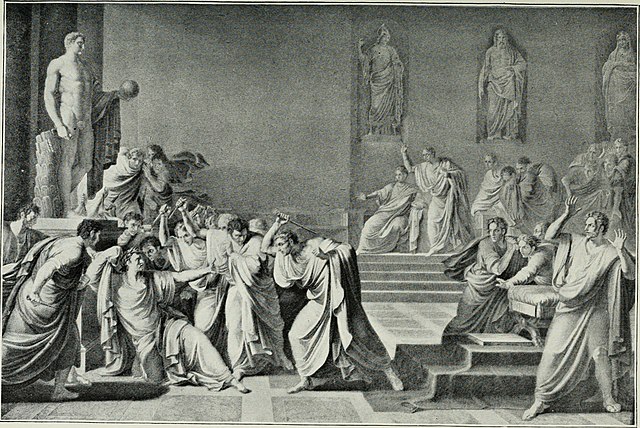It’s March 15, 2022.
BEWARE THE IDES OF MARCH
The phrase still echoes through our times two millennia later.
In 44 BC, it was the Ides of March, a day to settle debts. Julius Caesar had been named Dictator for Life, which was an aberration on the traditional republican way of governance. The Senate still existed. But the traditional role of a dictator to fix a problem with his temporary powers and then retire had disappeared in light of Caesar’s newly pronounced title. Caesar did not assuage fears with soft words but boldly embraced his powers and permanence in office. It was as much due to this affront and the fear it raised as any other reason that his closest associates rose up against him, full-filling the prophecy and warning to Caesar to beware the Ides of March.
Cassius and Brutus killed him, with 60 or more Senators looking on and seeing nothing.
His nephew-adopted son, Octavian, then fought for control against Marc Antony and others.
VENGANCE.
In 40 BC, after winning a battle, Octavian sacrificed 300 Senators and Equites (knights or cavalry soldiers) on the Ides of March in commemoration of Julius Caesar’s death anniversary. This also eliminated a strong contingent of his opposition.
Octavian eventually succeeded in war and was crowned Caesar Augustus, becoming the new emperor in 27 BC. Caesar Augustus recognized the Senate in his decision to preserve, as a façade, as much of the old Republic that would not interfere with the new monarchy. He wanted to avoid the same fate as his uncle/adoptive father Julius Caesar. Critics abounded, however. While Ovid, Virgil and Horace praised, accepted and adjusted to the new monarchy, Livy and others continued to write in opposition.
BOOK BURNING.
How to silence the opposition and promote confidence in the new empire? Caesar Augustus took no direct action, but he did look on favorably as the Senate, purged of many of his critics, tried to curry his favor. They decided to ban critical dissent by burning histories and books[1]. They claimed the dissent slandered esteemed nobility and high-ranking men and women of the new monarchy. These book burnings, early in time and rare in the ancient cultural climate, included works by Labenius and Cassius Severus. They occurred between 8 and 12 AD.
Later, under Tiberius in 25AD, Cremutius Cordus was prosecuted for treason for praising the republicans Brutus and Cassius in their assassination of Julius Caesar.
[1] They wouldn’t have been “books” as we think of them. Books (or volumes) consisted of hand-copied scrolls, generally about 35 feet in length, 10 inches wide, and were reproduced by slaves. There were book markets and wide availability.
TAKE-AWAYS.
Burning books that criticize power, banning opposition, and suppressing political or religious heretical thinking is and has long been a tool used by those in power to maintain or stabilize their control. It works in the short term. But despite the book burnings, despite the longevity of Ovid, Virgil and Horace and the victors in this Roman war, the concepts of the opposition, their ideas and preference for a republican form of government with shared power rather than a single autocratic emperor, has not been obliterated. The republican form of government, combined with even more democratic notions, is now prevalent in America and much of the rest of the world. We oppose tyranny.
Beware the Ides of March.

